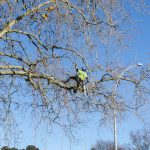Embracing Sustainable Tree Care Practices
Eco-friendly tree care plays a vital role in maintaining the health of our trees and the environment. Traditional tree care methods can often have a significant environmental impact, so shifting towards sustainable practices brings various benefits, including reducing waste, conserving resources, and minimizing chemical use. This article explores practical and sustainable approaches to tree care that can help you minimize your environmental impact.
Understanding Sustainable Tree Care
Sustainable tree care involves using practices that minimize negative effects on the environment while ensuring the health and vitality of trees. The key principles of sustainability include reducing waste, conserving resources, and limiting the use of harmful chemicals. Sustainable practices offer not only environmental benefits, such as improved soil health and biodiversity, but also economic advantages by reducing the need for costly chemical treatments and excessive water usage.
Soil Health and Tree Nutrition
The health of the soil is crucial for tree vitality. Testing the soil before fertilizing helps ensure that trees receive the appropriate nutrients they need for healthy growth. Instead of using synthetic fertilizers, consider organic alternatives and compost, which enrich the soil naturally without harming the environment. Mulching is another effective way to improve soil health, as it helps retain moisture, control weeds, and regulate soil temperature.
Water Conservation
Effective watering practices are essential for sustainable tree care. Overwatering not only wastes water but can also lead to root rot and other issues. Water trees during early mornings or late afternoons to minimize evaporation and use techniques like drip irrigation to conserve water. Rainwater harvesting is a practical solution for supplementing irrigation needs, and planting drought-tolerant tree species can also significantly reduce the amount of water required.
Eco-Friendly Pest and Disease Management
Integrated Pest Management (IPM) is an eco-friendly approach to managing pests with minimal environmental impact. It involves using a combination of biological, cultural, and mechanical controls to manage pest populations. Biological controls, such as introducing natural predators and beneficial insects, can naturally keep pest numbers in check. Natural pesticides, such as neem oil and insecticidal soap, can provide effective, non-toxic alternatives to chemical pesticides.
Pruning and Maintenance
Proper pruning techniques are essential for sustainable tree care. Incorrect pruning can cause unnecessary damage to trees and lead to long-term health issues. Following seasonal pruning guidelines helps ensure that trees grow healthily and reduces the spread of disease. Tool maintenance and recycling tree waste as mulch or compost are additional ways to reduce the environmental impact of pruning and maintenance.
Tree Selection and Planting
Selecting native and climate-appropriate species supports local ecosystems and reduces the need for extensive care. Assessing the planting site and preparing it properly can significantly improve a tree’s long-term health. Planting a diversity of species enhances resilience against pests and diseases, reducing the need for chemical interventions.
A Sustainable Future for Tree Care
Adopting sustainable tree care practices benefits both your trees and the environment. By embracing eco-friendly practices like soil health management, water conservation, and natural pest control, you can nurture healthier trees while minimizing your environmental impact. Take the first step towards sustainable tree care by integrating these practices into your routine and seeking professional advice when needed.



